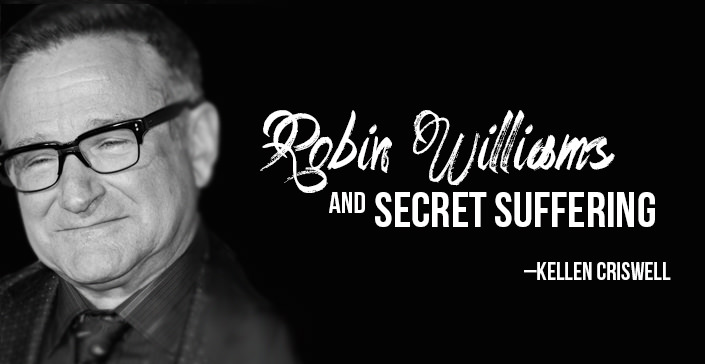
Mrs. Doubtfire. Hook. Dead Poet’s Society. Good Will Hunting. These have been some of my favorite movies growing up. Monday night I, like many, received the sobering news that an artistic legend had passed from this life into eternity with the death of Robin Williams.
What was more surprising to me than the tragic news of Williams’ death was the way in which he died. Suicide? Robin Williams? The man who seemed to have as much joy in every interview I ever saw him do as he portrayed in the funniest roles he played on screen? I was a bit surprised. And yet, this is the cold hard reality- this man who seemed on the outside to most of the masses to embody a life of laughter and affluence was dealing with a depression that would not let loose of him on the inside. It was sadness so great that he determined taking his own life would be a worthwhile alternative than to continue living with his affliction.
I am deeply saddened for the family and friends that Williams leaves behind. My heart goes out to them. I am also personally sad to think of the reality of what has happened as it relates to the masses that have adored Williams as fans. Robin Williams, in my view, is one of those rare people who were given an exceptional amount of God-given capacity to be a true pioneer and standard in their passion and career.
While lots of authors will be writing about a wide variety of valid things inspired by Robin Williams’ life and death over the coming weeks, as a Christian, I have found my thoughts diverted toward the church in the wake of his passing. I have been surprised, as I have read some of the initial accounts regarding the depression that drove Robin to take his own life given by people who seem to have known him well. My impression is that many people who have known Williams for some time found the news of his suicide to be as surprising as someone like me, a mere fan who never met the man. From my limited knowledge it appears that the internal suffering Williams endured was a bit of a secret to the general world around him. Of course, his suffering wasn’t secret in the sense that nobody was aware of it; it was secret in the sense that the general masses with a superficial window into his life were completely unaware of the ongoing inner turmoil that haunted him.
Secret Suffering in the Church
This is where my thoughts drift from the tragic situation with Williams to an important issue we deal with in Christianity- the issue of secret suffering.
There are many followers of Jesus, who from a superficial level, seem to be living a joyful life but are, in reality, dealing with deep depression and a sense of hopelessness. Let me be clear- I am not speaking of people who merely attend a Christian church or grew up in a Christian home but do not know Jesus and are not actually born again. I am speaking of truly born again people who, in spite of their genuine relationship with God, endure intense and lasting dark seasons of the soul. There are many people who had a legitimate conversion experience, love Jesus, read their Bible and sing in corporate worship, who do not know why the darkness they feel does not lift with greater frequency or permanence. These are the quiet sufferers. We see them in the corporate gatherings of the church on a weekly basis donning a smile but are unaware of the spiritual desert that resides beneath their skin.
Secret Suffering and Gospel Safety
Why is our suffering so often secret? Why do believers in Christ who know the eternal and unequivocal forgiveness of God in Christ, and the universal brokenness of humanity choose to sit alone in our pain in the recesses of the heart and mind?
I believe a core reason we are unaware of the emotional pain people are going through is that we lack a culture of gospel safety in our churches. By gospel safety I mean the security that results in transparency between people when they are convinced that each of them utterly need and have been granted God’s grace for their brokenness.
If I really believe and feel the depth of my need for God’s grace, and know that I have it through faith in the gospel, I will be able to hear you be transparent about your need for grace without my spiritual gag reflex going off. I will be able to listen to you be honest about your darkest temptations, grossest sins, or most painful manifestations of brokenness without viewing or treating you as someone with a worse-off spiritual condition than my own. If you really believe and feel the depth of your own need for grace and that faith in the gospel has supplied all the grace you need, you will be secure enough to hear me be transparent about the same things with you. This is gospel safety.
Church: An Unsafe Place
Sadly, the gospel safety that is ideal for our relationships does not always exist. Church is an unsafe place in the minds of many people. There are many reasons for that. Sometimes Christians are too quick to dismiss the legitimacy of depression and emotional pain when people share their burdens. Perhaps this is because we have been taught to downplay the legitimacy of emotion in our relationship with God in favor of a more cerebral version of Christianity. Or perhaps we have been taught that psychological study or influence has zero to offer the Christian in dealing with the challenges of life in a fallen world, and we are afraid of becoming (or appearing) too secular in our understanding of human struggles. I have heard and uttered things like, “If you are born again and filled with the Spirit, you won’t be depressed.”
The more I think about attitudes and messages like these, the more ashamed I am. At times I think we have a bubble-gum version of Christianity that leaves no room for the book of Lamentations or countless Psalms penned by souls wrestling with emotional turmoil. In reality, all humans are damaged by the effects of sin. We are all broken people. And the truth is, no one is more broken than those who falsely believe they are whole.
We follow a Jesus who was “a man of sorrows, acquainted with grief” who “wept” bitterly over loss and pain. Our simplistic responses to depression can shame people who need to be pointed to a Savior who understands the dark night of the soul more than any other. They need the comforting words of the Christ to form on the lips of His people who can speak healing into their life. But hasty responses force people to keep their pain in the shadows for fear of shame and rejection. People, even Christian people, who have feelings of shame and rejection heaped onto a heart already weighted down with heavy depression tend to spiral.
If you have been going to church with an extra ache in your heart because you wonder if you are the only one carrying a cloud of what may even feel like irrational sorrow, let Jesus liberate you with the truth- You are NOT the only one who feels the pain you feel. You are not a special case of uniquely messed up sinner. You are not somehow more damaged by sin and the fall than the other smiling people you see at church. All people, all Christians, are dealing with brokenness in their lives. All pastors are dealing with brokenness in their lives. It may manifest differently, but it manifests none-the-less. The good news is that we have a Savior in Jesus who sympathizes, comforts, and restores, who will ultimately mend every broken heart that turns to Him for help in His time.
Pursuing a Culture of Openness and Grace
Christian, when we hear of other people struggling with depression, lets work together to respond in humble, empathetic compassion. Let’s ask God for grace to really feel the truth of our shared brokenness as human beings that we might be able to create a culture of openness about the things we need help enduring.
If you are personally struggling with depression, consider sharing your wounds. Find someone that exudes grace who you can trust, and share your burden. Perhaps your act of honesty will spark a transparency revolution that results in the healing of yourself and other broken people.
If you are a pastor, lead the way. Faking like you have it all together and don’t deal with heaviness of soul helps no one. It will continue to leave the people in your church suffering silently, wondering why they cannot be super Christians like you. I understand we cannot be equally open from the pulpit as we are in elder’s meetings. But we need to prayerfully share our own human suffering in appropriate ways and point to Jesus as the help we ALL (including ourselves) need.
If you are depressed and do not know the Jesus of the Bible, there is no better friend to the sorrowful than Him. Truly, He is the only source of complete and ultimate healing. He will meet you where you are at right now with grace to help in your time of need. Ask Him.
“The Spirit of the Lord is upon Me,
Because He has anointed Me
To preach the gospel to the poor;
He has sent Me to heal the brokenhearted,
To proclaim liberty to the captives
And recovery of sight to the blind,
To set at liberty those who are oppressed” – Jesus (Luke 4:18)
Recommended Resources
Spiritual Depression: It’s Causes and Cures by David Martyn Lloyd-Jones
www.ccef.org/counseling









